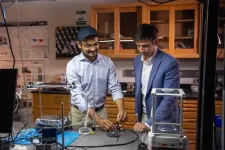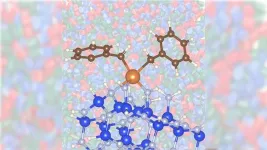(Press-News.org) New research led by UCLA Health has found that specific genes may be related to the trajectory of recovery for stroke survivors, providing doctors insights useful for developing targeted therapies.
Published in the journal Stroke this month, the findings were part of an exploratory study that sought to find if candidate genes could predict a higher likelihood of stroke outcomes related to depression, post-traumatic stress disorder and cognitive decline.
Dr. Steven C. Cramer, MD, the study’s lead author and a professor of neurology at UCLA, said while there are some predictors physicians can use to anticipate stroke recovery, such as a patient’s age or baseline health, they only tell part of the story.
“In the big picture, the issue that we face is that, when somebody has a stroke, it’s hard to anticipate what's going to come next,” said Cramer. “People look up to us from the gurney in the ER and say, ‘What's next? What's going to happen to me?’ People want to understand what their trajectory will be, people want to have a sense of how well going to be, or not, and what treatments are available to them.”
Similarly, clinicians who treat patients with stroke need improved methods to understand how a patient will fare in order to develop a personalized medicine approach for each individual, Cramer said.
Past studies have provided evidence that genetic differences are related the process of stroke recovery, but there has been limited study on the specific outcomes with which these genes are associated. For example, most previous genetic studies related to stroke have relied on the modified Rankin scale, which is a measure of global disability that combines recovery data across all behaviors into one single-digit score.
However, Cramer said this scoring system does not account for the granular differences in stroke outcomes for patients, such as a patient having improved movement but continued severe depression, or having persistent anxiety but showing good recovering of arm movement. As a result, Dr. Cramer, in collaboration with Dr. E. Alison Holman at UC Irvine, sought to determine whether there was a method to more precisely measure the various behavioral outcomes among stroke survivors.
To do this, Cramer and his team measured details for a group of candidate genes to examine in more than 700 patients enrolled throughout the U.S. Additionally, researchers conducted detailed behavioral assessments of the participants’ cognitive health, depression, post-traumatic stress disorder symptoms, and other deficits for one year after the stroke.
The study found significant associations between certain genes and these behavioral health outcomes. Specifically, the rs6265 gene variant was associated with poorer cognition. This gene variant is related to brain-derived neurotrophic factor, or BDNF, which is the most common growth factor in the brain and is strongly associated with learning. About 20-30% of people are estimated to have this genetic variant, which slows the release of BDNF.
“Your brain gushes out BDNF when you’re learning new things,” Cramer said. “Hopefully your brain is gushing out BDNF at this very moment. People who have this gene variant had poorer cognitive status at one year.”
Environmental factors, such as stressors, also played a role in genetic expression among stroke patients. Patients with the gene variants rs4291 and rs324420 were at higher risk for developing more severe depression and PTSD symptoms after one-year post-stroke.
“The more stress they reported, the more the gene variant was associated with poorer outcomes,” Cramer said.
Another variant, rs4680 was linked to lower depression and PTSD symptoms.
While the results still require independent verification, Cramer said these insights could help physicians and other allied health professionals tailor treatment options for patients based on a simple genetic test.
“If these discoveries are validated as accurate, you could look at someone on the day they have their stroke and say, ‘I know that on average you are at higher risk of a poorer outcome regarding cognitive function a year from now,’” Cramer said. “Maybe those are the people that need extra cognitive rehab or maybe one day we’ll have a drug that targets certain gene receptors. The idea is that you could divide people into different groups and use that knowledge not just for prediction but hopefully one day for improved, individualized treatment.”
Article: Cramer SC, Parodi L, Moslemi Z, Braun RG, Aldridge CM, Shahbaba B, Rosand J, Holman EA, Investigators SS. Genetic Variation and Stroke Recovery: The STRONG Study. Stroke. 2024;55:2094-2102. doi: 10.1161/STROKEAHA.124.047643
END
Stroke recovery: It’s in the genes
UCLA Health researchers say genetic variants were strongly associated with depression, PTSD and cognitive health outcomes
2024-07-24
ELSE PRESS RELEASES FROM THIS DATE:
Foam fluidics showcase Rice lab’s creative approach to circuit design
2024-07-24
HOUSTON – (July 24, 2024) – When picturing next-generation wearables and robotics, the foam filling in your couch cushions is likely not the first thing that comes to mind.
However, Rice University engineers have shown that something as simple as the flow of air through the airy, meshlike structure of open-cell foam can be used to perform digital computation, analog sensing and combined digital-analog control in soft textile-based wearable systems.
“In this work, we integrated material intelligence — the ability of materials to sense and respond to their environment ...
Montana State scientists publish evidence for new groups of methane-producing organisms
2024-07-24
A team of scientists from Montana State University has provided the first experimental evidence that two new groups of microbes thriving in thermal features in Yellowstone National Park produce methane – a discovery that could one day contribute to the development of methods to mitigate climate change and provide insight into potential life elsewhere in our solar system.
The journal Nature this week published the findings from the laboratory of Roland Hatzenpichler, associate professor in MSU’s Department of Chemistry and Biochemistry in the College ...
Daily rhythms depend on receptor density in biological clock
2024-07-24
In humans and other animals, signals from a central circadian clock in the brain generate the seasonal and daily rhythms of life. They help the body to prepare for expected changes in the environment and also optimize when to sleep, eat and do other daily activities.
Scientists at Washington University in St. Louis are working out the particulars of how our internal biological clocks keep time. Their new research, published July 24 in the Proceedings of the National Academy of Sciences, helps answer longstanding questions about how circadian rhythms are generated and maintained.
In all mammals, the signals for circadian rhythms come from a small part of the brain called the suprachiasmatic ...
New England Journal of Medicine publishes outcomes from practice-changing E1910 trial for patients with BCR::ABL1-negative B-cell precursor acute lymphoblastic leukemia
2024-07-24
A significant survival improvement for adults with newly diagnosed BCR::ABL1-negative B-cell precursor acute lymphoblastic leukemia is published today by the New England Journal of Medicine. The practice-changing finding is from the randomized phase 3 study E1910 (NCT02003222), which evaluated blinatumomab immunotherapy in patients who were in remission and tested negative for measurable residual disease (MRD) after an initial round of chemotherapy. At 3 years of follow-up, 85% of the patients who went on to receive additional standard consolidation chemotherapy plus experimental blinatumomab were alive, compared to 68% of those who received chemotherapy only.
Blinatumomab (Blincyto, ...
Older adults want to cut back on medication, but study shows need for caution
2024-07-24
More than 82% of Americans age 50 to 80 take one or more kinds of prescription medication, and 80% of them say they’d be open to stopping one or more of those drugs if their health care provider gave the green light, a new University of Michigan study shows.
But it’s not as simple as that, the researchers say. They call for prescribers and pharmacists to talk with older adults about their personal situation and figure out if any kind of “deprescribing” is right for them.
The study, published in the Journal of General Internal Medicine, uses data from U-M’s National Poll on Healthy Aging, and builds on a poll report issued in April 2023.
It ...
Nationwide flood models poorly capture risks to households and properties
2024-07-24
Irvine, Calif., July 24, 2024 – Government agencies, insurance companies and disaster planners rely on national flood risk models from the private sector that aren’t reliable at smaller levels such as neighborhoods and individual properties, according to researchers at the University of California, Irvine.
In a paper published recently in the American Geophysical Union journal Earth’s Future, experts in UC Irvine’s Department of Civil and Environmental Engineering caution that relatively new, nation-scale flood data provides an inadequate representation of local topography and infrastructure, factors known to control the spread of floods ...
Does your body composition affect your risk of dementia or Parkinson’s?
2024-07-24
MINNEAPOLIS – People with high levels of body fat stored in their belly or arms may be more likely to develop diseases like Alzheimer’s and Parkinson’s than people with low levels of fat in these areas, according to a study published in the July 24, 2024, online issue of Neurology®, the medical journal of the American Academy of Neurology. The study also found that people with a high level of muscle strength were less likely to develop these diseases than people with low muscle strength.
“These neurodegenerative diseases like Alzheimer’s and Parkinson’s affect over 60 million people worldwide, and that number is expected ...
Researchers discover faster, more energy-efficient way to manufacture an industrially important chemical
2024-07-24
Polypropylene is a common type of plastic found in many essential products used today, such as food containers and medical devices. Because polypropylene is so popular, demand is surging for a chemical used to make it. That chemical, propylene, can be produced from propane. Propane is a natural gas commonly used in barbeque grills.
Scientists from the U.S. Department of Energy’s (DOE) Argonne National Laboratory and Ames National Laboratory report a faster, more energy-efficient way to manufacture propylene than the process currently used.
Converting propane into propylene ...
AI model identifies certain breast tumor stages likely to progress to invasive cancer
2024-07-24
Ductal carcinoma in situ (DCIS) is a type of preinvasive tumor that sometimes progresses to a highly deadly form of breast cancer. It accounts for about 25 percent of all breast cancer diagnoses.
Because it is difficult for clinicians to determine the type and stage of DCIS, patients with DCIS are often overtreated. To address this, an interdisciplinary team of researchers from MIT and ETH Zurich developed an AI model that can identify the different stages of DCIS from a cheap and easy-to-obtain breast tissue image. Their model shows that both the state and arrangement ...
Researchers are closing in on a mouse model for late-onset Alzheimer’s
2024-07-24
Mice don’t get Alzheimer’s—and while that’s good news for mice, it’s a big problem for biomedical researchers seeking to understand the disease and test new treatments. Now, researchers at The Jackson Laboratory are working to create the first strain of mice that’s genetically susceptible to late-onset Alzheimer’s, with potentially transformative implications for dementia research.
In humans, two of the defining traits of Alzheimer’s disease are amyloid plaques between brain cells, and tangles of tau proteins within neurons. In mice, however, intercellular ...
LAST 30 PRESS RELEASES:
A promising potential therapeutic strategy for Rett syndrome
How time changes impact public sentiment in the U.S.
Analysis of charred food in pot reveals that prehistoric Europeans had surprisingly complex cuisines
As a whole, LGB+ workers in the NHS do not experience pay gaps compared to their heterosexual colleagues
How cocaine rewires the brain to drive relapse
Mosquito monitoring through sound - implications for AI species recognition
UCLA researchers engineer CAR-T cells to target hard-to-treat solid tumors
New study reveals asynchronous land–ocean responses to ancient ocean anoxia
Ctenophore research points to earlier origins of brain-like structures
Tibet ASγ experiment sheds new light on cosmic rays acceleration and propagation in Milky Way
AI-based liquid biopsy may detect liver fibrosis, cirrhosis and chronic disease signals
Hope for Rett syndrome: New research may unlock treatment pathway for rare disorder with no cure
How some skills become second nature
SFU study sheds light on clotting risks for female astronauts
UC Irvine chemists shed light on how age-related cataracts may begin
Machine learning reveals Raman signatures of liquid-like ion conduction in solid electrolytes
Children’s Hospital of Philadelphia researchers emphasize benefits and risks of generative AI at different stages of childhood development
Why conversation is more like a dance than an exchange of words
With Evo 2, AI can model and design the genetic code for all domains of life
Discovery of why only some early tumors survive could help catch and treat cancer at very earliest stages
Study reveals how gut bacteria and diet can reprogram fat to burn more energy
Mayo Clinic researchers link Parkinson's-related protein to faster Alzheimer's progression in women
Trends in metabolic and bariatric surgery use during the GLP-1 receptor agonist era
Loneliness, anxiety symptoms, depressive symptoms, and suicidal ideation in the all of us dataset
A decision-support system to personalize antidepressant treatment in major depressive disorder
Thunderstorms don’t just appear out of thin air - scientists' key finding to improve forecasting
Automated CT scan analysis could fast-track clinical assessments
New UNC Charlotte study reveals how just three molecules can launch gene-silencing condensates, organizing the epigenome and controlling stem cell differentiation
Oldest known bony fish fossils uncover early vertebrate evolution
High‑performance all‑solid‑state magnesium-air rechargeable battery enabled by metal-free nanoporous graphene
[Press-News.org] Stroke recovery: It’s in the genesUCLA Health researchers say genetic variants were strongly associated with depression, PTSD and cognitive health outcomes



